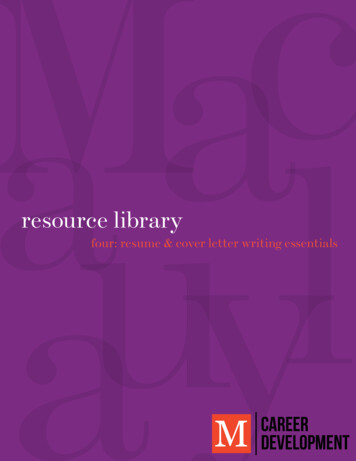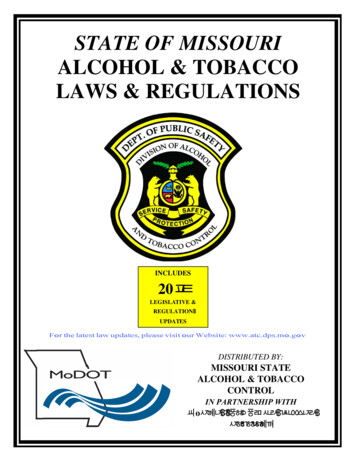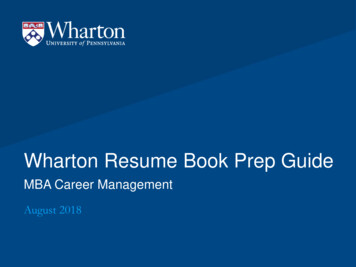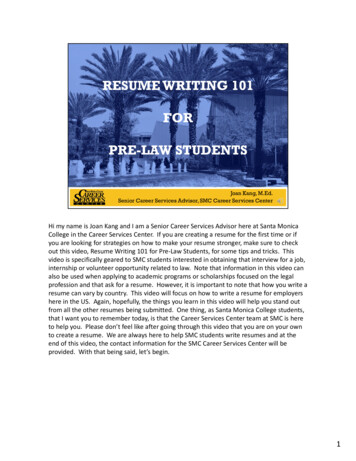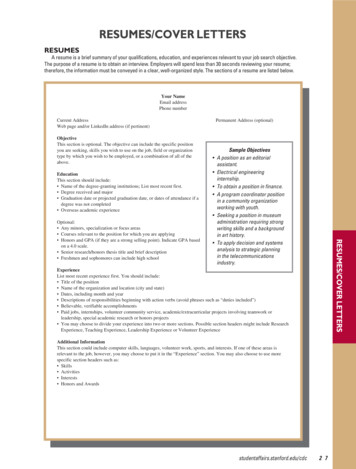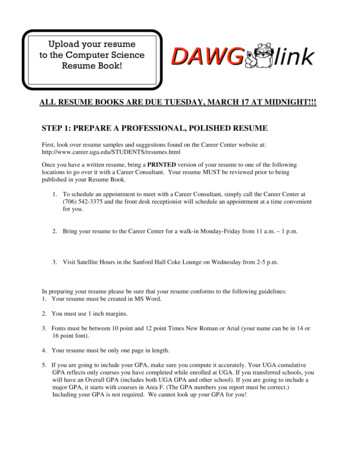
Transcription
DOCUMENT RESUMEED 311 449AUTHORTITLEINSTITUTIONCS 212 093Baron, DennisDeclining Grammar--and Other Essays on the EnglishVocabulary.National Council of Teachers of English, Urbana,Ill.REPORT NOPUB DATENOTEAVAILABLE FROMPUB TYPEEDRS 1p.National Council of Teachers of English, 1111 KenyonRd., Urbana, IL 61801 (Stock No. 10738-3020; 9.95member, 12.95 nonmember).Books (010) -- Viewpoints (120)MF01/PC10 Plus Postage.*English; Gr&mmar; Higher Education; *LanguageAttitudes; *Language Usage; *Lexicology; Linguistics;*Semantics; *VocabularyWordsABSTRACTThis book contains 25 essays about English words, andhow they are defined, valued, and discussed. The book is divided intofour sections. The first section, "Language Lore," examines some ofthe myths and misconceptions that affect attitudes towardlanguage--and towards English in particular. The second section,"Language Usage," examines some specific questions of meaning andusage. Section 3, "Language Trends," examines some controversialrtrends in English vocabulary, and some developments too new to havereceived comment before. The fourth section, "Language Politics,"treats several aspects of linguistic politics, from special attemptsto deal with the ethnic, religious, or sex-specific elements ofvocabulary to the broader issues of language both as a reflection ofthe public consciousness and the U.S. Constitution and as a refugefor the most private forms of expression. *************************Reproductions supplied by EDRS are the best that can be madefrom the original ******************************
"PERMISSION TO REPRODUCE THISMATERIAL HAS BEEN GRANTED BYJ. MaxwellTO THE EDUCATIONAL RESOURCESINFORMATION CENTER (ERIC)."U S. DEPARTMENT OF EDUCATIONOnce of Educanonai Research and improvementEDUCATIONAL RESOURCES INFORMATIONCENTER (ERIC)0 This document nas been reproduced asreceived Irons Ine person or organizationoriginating ItO Minor changes rave been made to improvereproduction QualityPoints of view or opinions stated in t rus docu-ment do not necessarily represent otnuaiOEM position or poky,
Declining Grammar
Declining Grammarand Other Essayson the English VocabularyDennis BaronUniversity of Illinoisat Urbana-ChampaignNatiOnal Council of Teachers of English1111 Kenyon Road, Urbana, Illinois 61801
NCTE Editorial Board: Donald R. Gallo, Richard Lloyd-Jones, Raymond J.Rodrigues, Dorothy S. Str:ckland, Brooke Workman, Charles Suhor, ex officio,Michael Spooner, ex officioStaff Editor: Robert A. HeisterCover Design: Doug BurnettInterior Design: Tom Kovacs for TGK DesignNCTE Stock Number 10738-3020 1989 by the National Council of Teachers of English. All rights reserved.Printed in the United States of America.It is the policy of NCTE in its journals and other publications to provide aforum for the open discussion of ideas concerning the content and the teachingof English and the language arts. Publicity accorded to any particular pointof view does not imply endorsement by the Executive Committee, the Boardof Directors, or the membership at large, except in announcements of policy,where such endorsement is clearly specified.Library of Congress Cataloging-in-Publication DataBaron, Dennis E.Declining grammar and other essays on the English vocabulary /Dennis Baron.p.cm.Bibliography: p.ISBN 0-8141-1073-81. English languageLexicology. 2. English languageSemantics.3. English languageUsage. I. Title.PE1571.B37 1989420dc2089-34420CIP5
ContentsPrefaceIviiLanguage Lore11Weather Report32The Myths of Language93The Passive Voice Can Be Your Friend174Brevity and Style235Going Native316Basic Words377The Myths of Teaching English49IILanguage Usage638Declining Grammar659A Literal Paradox73Academies of One The Criticsand English Usage8111Thank You for Sharing9712Dialect Notes10III107Language Trends11313The Etymology Trap11514At a Loss for Words12115What's in a Name?131vC
viDeclining Grammar16Telephone Talk14517Ending Words15318Nothing Like a Good Pun159Language Politics17119Language Is the Enemy17320Race and Religion17921Sexist Language18922The Missing Word19523Language and Liberty20524The English Language and the Constitution21325Private Words225Bibliography233Author240IV7
PrefaceThe essays in this book, written over the past two years, began asresponses to particular problems arising during my earlier work onattempts to reform the English language, and on the question oflanguage and sex (Baron 1982a, 1982b, 1986). Although they starter,as discrete entities, a pattern gradually developed interconnecting theessays and establishing a progression from start to finish. Consequently,while most of the chapters may be read independently of one another,or in small groups of two or three, they also cohere to form a bookabout where the English languageparticularly its vocabularyhasbeen, where it is now, and where it is going.Declining Grammar is about English words, how we define them,value them, and argue over them. And it is about the importance weattach to English as the language of our individual and our nationalexpression. One of the things readers will discover in this book is theextent to which mistaken ideas about language influence languagedevelopment. We will look at some of the attitudes toward Englishfrequently expressed by language commentators, and some of theways in which our languageparticularly our vocabularyis changingand developing to meet the new demands placed on it.In the first section, we will examine some of the myths and mis-conceptions that affect our attitudes toward languageand towardEnglish in particular. False or skewed ideas about language crop upin everyday conversation. They influence the criteria we set for properwriting style and contribute to our hazy notions of what constitutesstandard English. Ultimately they affect how English teachers teachabout our language, a subject which continues to vex students, teachers,and the American public at large.The second section examines some specific questions of meaningand usage. "Declining Grammar," the book's title essay, traces the upsand particularly the downs in the meaning of the word grammar, whichwent from something originally very positive to something that is nowrather negative, though this latter fact is generally ignored by ourdictionaries. The other chapters in this section look at specific usagecontroversies of the past and present to demonstrate that while therevii
viiiDeclining Grammaris little agreement on what constitutes proper English, the endlessdebate over language standards shows that language concerns arenever far from our consciousness.Section three examines some controversial trends in English vocab-ulary, and some developments too new to have received commentbefore. The final section treats several aspects of linguistic politics,from specific attempts to deal with the ethnic, religious, or sex-specificelements of our vocabulary to the broader issues of language both asa reflection of our public consciousness and constitution and as arefuge for our most private forms of expression.A great many people have listened patiently to the ideas exploredin this book. My family, colleagues, and friends have contributedexamples and counterexamples too numerous to mention. I want tothank the staff and audience of WILL-AM, the American Public Radioaffiliate at the University of Illinois at Urbana-Champaign, for theopportunity to air my views on language in a continuing series ofcommentaries. And I want to thank the National Council of Teachersof English, and its Commission on the English Language, fur theiractive encouragement and support of my work Released time providedby the University of Illinois allowed me to complete my manuscript.Earlier drafts of some of the essays in this book have appearedelsewhere, sometimes under different titles. Parts of "Academies ofOne" appeared in the English Journal, and William Safire has cited anumber of my usage comments in his books and his columns in theNew York Times Magazine. "Nothing Like a Good Pun" was firstpublished as "Public Cutespeak" in Verbatim, the Language Quarterly."Sexist Language" and "A Literal Paradox" originally appeared inRighting Words. "The English Language and the Constitution" waspublished in The Brandeis Review. "Declining Grammar" appeared as"The Ugly Grammarian" in English Today, and "The Passive Voice CanBe Your Friend" was published in the same journal. Parts of "TheMyths of Teaching English" will be published under the title "WatchingOur Grammar" in Essays for English Teachers, edited by Gail Hawisherand Anna Soter (Albany: SUNY Press, 1989). All are reprinted withpermission. I also want to extend my gratitude to Boughton MifflinCompany for permission to reprint the first 100 words of the BrownCorpus from Nelson and KuCera's Frequency Analysis of English Usage,and to Longman Group Limited for permission to reprint the first 100words of the LOB Corpus from Hofland and Johansson's Word Frequencies in British and American English.Most of all, I want to thank the teachers who participated in theWriting Outreach Workshop sponsored by the English Department at9
Prefaceixthe University of Illinois at Urbana-Champaign, during the summersof 1986 and 1987. It was your enthusiasm for the English languageand your dedication to our profession that inspired this Lollection, andit is to all o; you that I dedicate this book.
I Language Lore
1 Weather ReportLanguage, like the weather, is a popular topic: everybody's got something to say about it. And like the weather, where there is language,there is also change. One of the most common weather sayings goessomething like this: "If you don't like the weather around here, justwait five minutes." You hear this in New England and the Midwest,in California and the South, and while it is sometimes attributed toMark Twain or Thoreau or Emerson, it has achieved the status ofproverbial folk wisdom.Language changes like the weather, cyclically, seasonally, accordingto forces that seem mysterious if not sinister to the average person,and we could modify our weather proverb to apply to language: "Ifyou don't like the way language is used now, just wait five minutes;you'll like it even less," since those who complain about the languageare never happy for long.The metaphors we use to describe this change for the worse revealour inner feelings about English. We think of language in terms oforganic imagery: it may live and grow, like a garden, if properlynourished and weeded, while in the hands of the common crowdso goes the opinion of the linguistic elitelanguage will sicken anddie. Some critics see bad usage as a virus causing physical illness,usually gastrointestinal, in those most sensitive to its nuances. Languagehas a moral life (corrupt language may be a force for ethical as wellas physical corruption), a political one (it may be anarchic, democratic,or autocratic in its structure), and an economic one as well (languagesmint, lend and borrow their words, like coins, and the debts that theyincur must eventually be repaid). Since we are used to thinking oflanguage in terms of metaphor, and we rely on language as a socialbarometer measuring the dass, education, and overall worthiness ofour fellow human beings, a weather model of language should not beall that revolutionary.In terms of its metaphoric treatment, language has a psychologicaland social life too. One currently popular view, an extension of theSapir Whorf hypothesis, considers language a cogniti e prisen whosewalls and bars control our thoughts and present our direct knowledge3
4Declining Grammarof reality. This theory sharply contrasts with the competing notion that'anguage is the transcendental representation of the real world andthus the source of all inner and outer knowledge. In this view, wordseither are cr bear an ineffable but nonetheless certain affinity to thethings they represent. According to either mouel, we cannot knowwhat we do not have words to express, a stricture which placesdepressing limitations on the human imagination.Practically speaking, though, language is neither a mirror or a prison,but a prism, a lens which affects our perceptions to a certain degree,but which we can also control and focus. In a more down-to-earthsocial model, language i,, a set of laws, initiated individually butadopted by consensus, as with any social compact, changing in responseto an ever-changing environment, and possessing in turn the powerto alter that environment. Those who transgress the laws of languageare open to censure. Frequently we view them as criminals need ofpunishment. In the eyes of the language judges, for example, peopleshould be imprisoned for using such supposed innovations as gift asa transitive verbThey gifted us with a copy of the book (a usage whichgoes back to the sixteenth century). or aggravate for irritate (a usagedating from the seventeenth century), while dangling hopefully at thestart of a sentence (Hopefully, this won't happea again), which is indeeda new construction, dating back only to the 1960s, is considered bythe authorities to be no less than a hanging crin-te.If we are to believe most of what we hear about English at cocktailparties or in the popular press, we have been heading downhill in ourspeech since some unspecified point in the past. Something is alwaysgoing wrong with the language; things are never as they used to be,or as they should be. Pessimists maintain that English is in a state ofdecay, and all our efforts to bring about or restores the "Golden Age,"where people gave language its due and used it correctly, fall on deafears. The language forecast for these doomsayers continues to be dim:partly cloudy with a sixty percent chance of double negatives.To complete the analogy between language and the weather, I havefound that we trust commentators on language about as much as wetrust meteorologists. Yet ironically, we can't seem to get along withouteither. No news broadcast is complete without the weather report, andwhile most of us don't open the newspaper simply to look for WilliamSafire's language column, or Ann Landers's advice on good grammar,popular books and articles on the state of the language generatedependable, often devoted audiences. Just as many of us rememberour schooltime exposure to English grammar with chagrin, if notoutright pain, we a:so carry inside us a model of an English teacher13
5Weather Reportwhose perfection we never managed to emulate, whose disappointmentin our performance did not make language study a dead issue butspurred us on toward new heights of correctness.The Facts of EnglishAlthough we all may have something to say about language, a littleknowledge often proves a dangerous thing. Much of what we do sayis wrong, for few of us take the trouble to study the science of language,yet quite a few of us go about pretending that science simply doesnot exist. Consequently, our ideas about language are based on subjective preference rather than objective fact. There is nothing unnaturalabout this, since subjectivity is one of the main forces behind languageuse. But we seldom acknowledge that our language judgments, or thejudgments of those whom we take for experts, are arbitrary, not gravenin stone but inked on wood pulp.Our attitudes toward language have a profound effect both onEnglish itself and on those who use it, but it is never easy to characterizethis effect with much precision because speakers of English displayan astonishing ambivalence toward their language. On one hand wedisparage our own abilities, constantly apologizing for our mistakes,real or imagined. More often than not we labor under the delusionthat our English is riddled with error, that it is inadequate to thedemands placed on us. In our unending desire to say or write it right,we seek out and defer to the opinions of teachers, editors, and usageexperts. But on the other hand, although we bemoan our linguisticincompetence and fret over our insecurity, we are also loath to acceptthe advice we so desperately seek. How dare anyone tell us what tosay or write, or how to go about it? It's undemocratic. There ought tobe a law.It is an unfortunate fact that many otherwise well-educated nativespeakers of English either reject or shy away from the formal studyof their own language. Since it became a fundamental part of theAmerican educational curriculum well over a century ago, studentsand even some teachershave resisted initiation into the mysteries ofgrammar, and the term grammarian has taken on a negative connotationthat is difficult to counteract. It is a further measure of our linguisticwaffling that we alternate complaints about too much grammar in ourschools with cries of not enough.Despite our endemic unhappiness with grammar instruction, informal interest in English remains keen. Language may not be a big-time14
6Declining Grammarissue in this country, like politics, religion, or the economy, but it isan issue that concerns everybody, and it surfaces all the time. Thepress regularly prints commentaries and editorials on the state ofEnglish. There are as well frequent stories about atiempts to reformour pronunciation, spelling, and grammar. The bureaucratic style ofgovernmental prose is continually held up for ridicule by all mannerof essayists and media commentators. Watchdog groups seek out thedeceptions embedded in public doublespeak. Individuals crusade againstthe misused apostrophe or the encroachment of quotation marks. Andthe introduction of new words is noted now with amusement, nowalarm. More important, though it still receives nowhere near theattention it deserves, is the fact that many of our citizens pass throughour schools without learning to read or write effectively.There is no doubt, then, that interest in language is high. And weare not always defensive about our linguistic prowess. Sometimes weplead ignorance, but just as often we are language bullies, correctingour relatives and friends (they may not stay friends for long), andeven our teachers. True, the public dutifully seeks out the advice ofthe numerous guides to good English, but should a usage authoritymake a mistake, scores of amateur guardians of our tongue are quickto respond with unkind censure.I myself have been guilty of language hubris. Once in high school Idared to challenge a pronunciation by the severest of my teachers. Theword in question was written gaol, the British spelling of our Americanjail. It is pronounced to rhyme with rail on both sides of the Atlantic,a fact which I knew in my precocity, but which my teacher had missed.Instead she said something with a hard g that rhymed with a drawnout cowl. I knew nothing then of spelling pronunciation, the reading ofwords not with their traditional sounds, but as they appear on the page,and I knew even less of classroom decorum and respect for authority,but once the correction was out of my mouth I knew I had done wrong.The class was silent. The teacher became dangerously calm. I was madeto walk the length of the room, up to the desk, and told to find gaolin the dictionary. This I did, though with difficulty, for I suddenly lostall sense of alphabetical order.Of course I was proved right. lwf at what cost! My teacher took thecorrection gracefully, more gracefully than I had offered it, but thingswere never the same between us. Nor did I become an instant folk heroamong the studentsI was just the fool who corrected Mrs. N. on someamazingly trivial point. With language, as with everything else, we allmust leam that there are times to be correct, and times to be still.15
Weather ReportGrammar and grammarWhen we speak of grammar we frequently confuse two of its basicsenses. Sometimes we divide these into graiamar as science andgrammar as art. I prefer to call these Grammar with a capital g, andgrammar with a small one. In any case, Grammar writ large refers tothe structure, or the formal features of a language, its sounds andsyllables, its morphemes, words, and sentences. It is a descriptivestudy, one which catalogues and inventories a language, accountingfor its elements accordi lg to the general pnnciples of linguistic science.grammar with the little g refers to the rules of preferred or prescribedusage associated with standard language. It is the etiquette of knowingwhich pronunciations or words or idioms are privileged, and whichare stigmatized. It is the art of being correct.These different grammars can get us into trouble, and the ordinaryEnglish speaker is often caught in the cross fire between (or is itamong?) the experts. When descriptive linguists go after the facts ofEnglish, which they must do for us to have a record of our tongue inall the stages of its development, they are sometimes accused orabandoning all standards and appioving language forms some peoplelabel as inferior. When prescriptivists attempt to lay out codes ofbehavior for all of us to follow, which they must do as well, for theytoo are part of the self-regulating system of our language, they seldomagree on general or specific principles. No matter how much we laudtheir efforts, we find the procrustean bed of the language commentatorstoo much for our unsupple limbs. The language commentator LoganPearsall Smith (1948) has called grammar in this prescriptive sense"the natural enemy of idiom." As hard as we may try to follow theiradvice, we become lost in the contradictory opinions of the prescribers.Aiming for an impossible standard of language perfection, we malienew mistakes, pushing English in new and unforeseen directions,provoking the language critics further still.In 1921 the Oxford philologist H. C. Wyld lamented that despite ourpersistent interest in things linguistic, too many of us resist the notionthat a considerable body of well-ascertained facts about language exists,and that a knowledge of linguistics can illuminate the language questionswhich concern teachers, writers, editors, and the general public. I hopewith this book to counteract in a small way this tendency to reject thefacts of English, and to encourage my readers to pursue the subject inall its fact and fancy well beyond the confines of these pages.1. 6'
2 The Myths of LanguageLanguage commentators and weather forecasters depend to some extenton signs -if the times for their predictions. Just as we look at cloudsand test the wind to estimate the weather, we listen to words or readmagazines and make claims about the direction of English. But wealso depend on folklore for our guesses. Red skies tell sailors all sortsof things about storm and calm, and we deduce the severity andduration of winter from the likes of woolly worms and groundhogs.General forecasts about language and literacy are similarly groundedin misinformation and myth.Some misinformation about language takes the form of advice:complete your sentences (many sentences are physically incomplete,yet completely understandable); never begin one with and; don'tcontract; avoid I and you. And, of course, avoid the passive voice.There is also myth: French is a rational language; Greek is democratic;Chinese is transcendental; English i. in a state of decline.The Myth of Elizabethan EnglishOne common American language myth asserts the existence of asettlement in a remote corner of the Ozarks, or possibly the Appalachians, where time stands still, where English is spoken today exactlyas it was in Shakespeare's time. Underlying this myth is another: thatthe original European settlers of this area were a racially homogeneousgroup of Scotch-Irish and English, an assertion that has been challengedand has never been proved. A recent public television series on theEnglish language went so far as to locate this untouched-by-timesettlement not in the mountains but in the Sea Islands off the Carolinacoast. Viewers saw the resident fisherfolk speaking in their quaint,old-fashioned ways. Of course this linguistic fountain of youth cannotexist, for no speech community, whether ethnically homogeneous ornot, can ever become frozen in time. Language never stops changing,no matter how isolatea its speakers are from the world around them,or how old-fashioned .hey sound tc others. As the sociolinguists Walt9
10Declining GrammarWolfram and Donna Christian remind us in their study of AppalachianEnglish (1976), the language of any group may be conservative insome aspects but progressive in others. Although Appalachian, Ozark,or Sea Island speech may preserve a few features of older Englishthat have been lost by other dialects, they also produce advancedfcrms that have not yet spread to other areas.As the Elizabethan English story suggests, a major function oflanguage myth is to mark one form of speech as purer than orotherwise superior to another. Some myths assert that language reflectsthe speaker's inner self. For example, it is a common but mistakennotion that the speech of city folk (or northerners), is too fast and toonasal and reflects an unfriendly disposition, while their southern (orrural) counterparts are wrongly characterized as slow of speech, withdrawling vowel habits that are supposed to evidence a combinationof sociability and decreased mental activity. Such commonly used termsas nasality and drawl are frequently subjective and invariably negative.To cite two personal examples, when I was in college a friend of minefrom central Illinois, whose accent seemed to my then-unpracticedNew York ears to evoke the deadly-drawling pace of antebellum Tara,likened the words of a Florida student we both knew to "bubblesslowly oozing up through the swamps!' And more recently a colleagueof mine at the University of Illinois, a professor with urbai., east coastorigins and an ivy league educationsomeone, in short, who wouldhe described by central Illinoisans as a snooty if not downright nasalYankeeonce complained that the one thing he hated most aboutliving in the Midwest was having his children grow up with what hecalled "that horrible midwestern nasal accent!'The myths sometimes deal with ways that language both channelsand limits hew we think. According to this view of language, we canonly conceive what our language has words to express. By extension,the more words a language has, the more its speakers can do withthem. In one hit of folklore we are askedenvy the semantic richnessof the Eskimo, whose language offers countless words (the numbervaries with the teller) for different kinds of snow: according to theEncyclopaedia Britannica there is "falling snow," "snow on the ground;'"drifting snow," "encrusted snow;' and so on. On the other hand, wemight pity speakers of those impoverished languages like English withonly snow and slush.We are also asked to sympathize with speakers whose languagesdistort or limit their cognition: some would argue that the syntacticstructure of German interferes with comprehension, since its periodicitymakes us wade through parts and parts of speech before coming to
The Myths of Language11the verb. They also point to an unnamed, mythical, primitive languagewhich, lacking a future tense, is supposed to prevent its users fromdeveloping any concept of time.Cultural bias enters clearly into these myths about the relationshipbetween language and cognition. English speakers seldom questiontheir assumption that the only natural way to think is to put the verbbetween subject and object, not before or after, though in Old Englishthe verb appeared in various parts of the sentence without anymeasurable interference with comprehension. And we never supposethat those earliest forms of our own language, which had no separatefuture tense, gave the first English folk any trouble conceiving yesterday,today, and tomorrow. Today's English offers several ways of namingwhat is yet to come, all of them dependent on the present tense: "Iclose (am closing, am going to close) the deal next Thursday:' Evenour so-called future tense requires the present inflection of the auxiliaryshall or will.Similarly, those who treasure lexical diversity often forget that despiteits many words for arctic precipitation, the Eskimo language lacks aterm for the general concept 'snow. (Arabic similarly has words fordifferent kinds of camels, though it lacks a generic term for camelitself.) This deficiency does not mean that Eskimo inhibits abstractionin its speakers, but rather that, in the case of snow, species outweighsgenus. There is a similar situation in American English, though it isnot quite analogous and hardly so picturesque: we readily iistinguishat least two score types of burgers by brand (Big Mac, Whopper) ortype (pizzaburget; tunaburger), having less and less recourse nowadaysto the basic hamburg. Surprisingly, no one takes this as evidence ofmodem overspecializing, or concludes that the American preoccupationwith chopped meat rivals what we naively suppose to be the Eskimoromance with weather.The Myth of GreekLanguage myths are subject to change, even to eventual debunking.We once thought that the form of government in a given societydetermined the nature of its language: an autocratic society fostered arigid, authoritarian language, while a democratically constituted societyliterally reflected the voice of the people. In the eighteenth century,speakers of English regarded classical Greek as the ideal language toimitate because it was developed by the first and foremost democracyof the ancient world. They also thought that Greek persisted unchangedover a millennium, a sure sign of a language that has reached perfection.
Declining Grammar12Now we know better. Participation in Greek, or rather Athenian,democracy was limited by class and sex, which did not disturbeighteenth-century philosophers but seems much less congenial to ourattitudes today. Furthermore, scholarship has shown that
number of my usage comments in his books and his columns in the New York Times Magazine. "Nothing Like a Good Pun" was first published as "Public Cutespeak" in Verbatim, the Language Quarterly. "Sexist Language" and "A Literal Paradox" originally appeared in Righting Words. "The English Language and the Constitution" was published in The .

